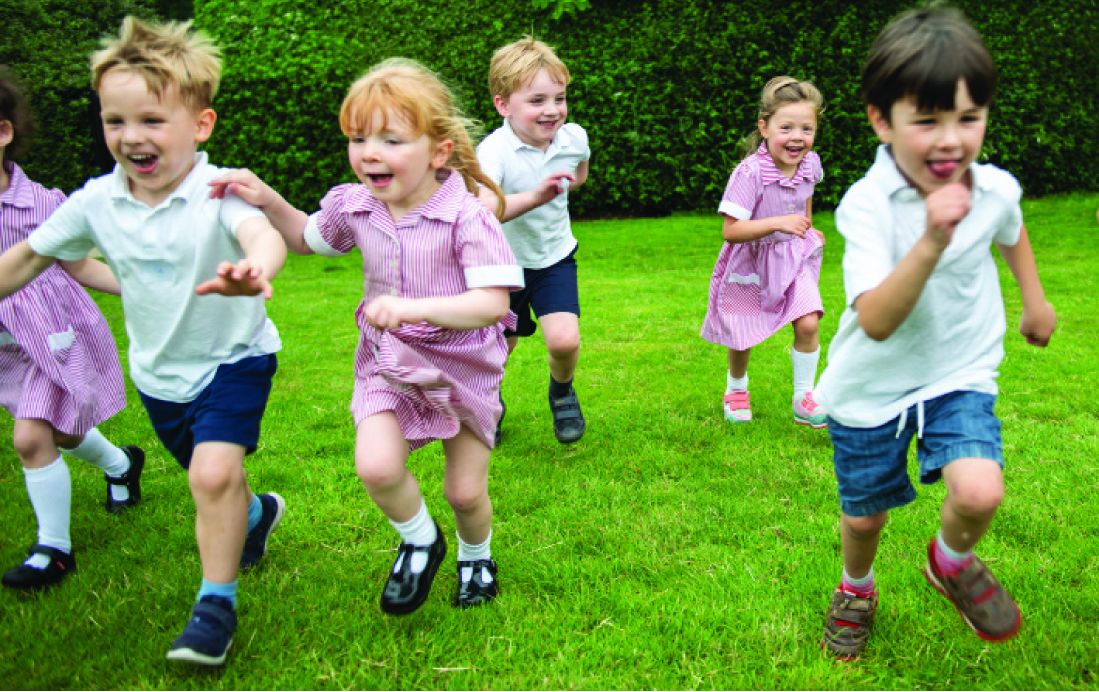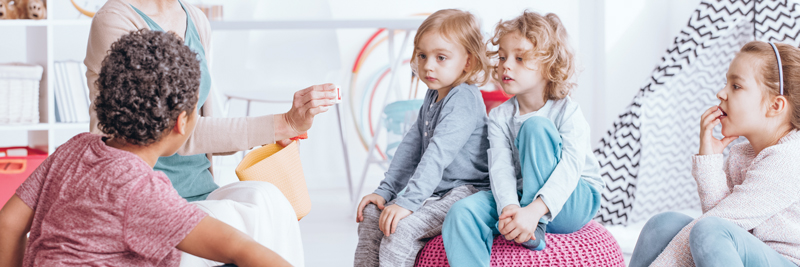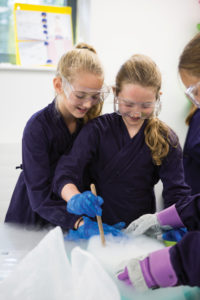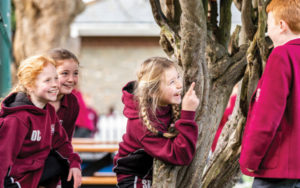Your child’s first day at nursery or playgroup can be a daunting prospect for both you and them. But our advice will help to ensure that their experience of nursery or playgroup is a happy one from the start.
Boost their social confidence
Socialising with other children is a skill that has to be learnt gradually, and some children will find it easier than others. If you can introduce them to the idea of sharing and taking turns before they start at nursery they will find the whole experience less daunting. Don’t expect great things at first – children usually play alongside each other rather than together until they’re around three years old. And while you don’t need to stand over young children while they play, you need to be close by to step in if they start to squabble over toys. If you don’t have a network of other mums with children the same age as yours, joining a mother and toddler group is a great way to introduce your child to socialising while you keep a watchful eye.
Time away from parents
It will be easier for your child to settle at nursery if you’ve gradually got them used to being left with other carers, such as grandparents, relatives and friends. Start off by leaving them for short periods – an hour while you go shopping, for example – and then gradually build it up until your child is happy to be left for a whole morning or an afternoon without you. Most children won’t like being left with nursery workers they don’t know at first, but it shouldn’t be long before they come home chatting about what “Mrs X said” and “Mrs Y did”.
Visit the nursery
“When you’re choosing a nursery, it’s usually best to visit it without your child the first time,” says Diane Rich at Early Education, an organisation which promotes quality in early years education. “The next time take your child with you and see how they respond to the environment and watch how the carers interact with them.”
You should be allowed as many familiarisation visits as you feel your child needs. Some nurseries will allow you to leave your child for short visits without you to see how they get on. When you get home, talk positively about the school, the activities that go on, the other children and the staff. Chat through any worries your child has before they start for real.
Potty training
Some nurseries will expect children to be out of nappies before they start, so find out what the policy is if you don’t think your child will be ready. However, all nursery staff should be prepared for occasional accidents and won’t expect children to ask every time they need the toilet – they’ll get plenty of gentle reminders. Pack spare pants and a change of clothes in your child’s bag just in case and tell them that no-one will be cross if they do have an accident.
Feeding themselves
If your child is to have any meals at nursery other than drink and biscuits, find out if they’ll be expected to use a knife and fork or whether hands are acceptable. Practise at home with a little knife and fork, but don’t expect your child to be able to cut up his own food – the staff will do this for him. Make sure you tell the nursery staff about any strong dislikes your child has, and any food allergies or intolerances.
On the first day
Allow plenty of time. The chances are, your child won’t be prepared for you to just drop him off and leave on the first day, so be prepared to hang around until they are settled.
You’ll probably be feeling just as anxious and emotional as they are, but try to stay cheery and confident – children pick up on your feelings of apprehension.
Explain to your child when you’ll be back – don’t fob them off with fibs such as “Mummy’s just going to move the car” when you make your exit. Tell them you’ll be back after lunch/drink and biscuit time/story time.
Leave your contact number with staff in case they need to call you.
If your child cries and won’t let you leave, ask staff for advice. In most cases they’ll ask you to stay for a while with your child in the early days.
When you’ve said your goodbyes, try not to worry. If there is a problem, you’ll be contacted, but in most cases your child will be enjoying their exciting new experience.
Borrow some books to help
Visit your local library and borrow some books on starting preschool or nursery, such as Going to Playschool by Sarah Garland. When you’ve read them, talk to your child about all the fun activities they might be doing at nursery, such as playing outside on bikes, painting pictures, playing with sand and water, making models, singing rhymes, baking cakes and building with bricks and lego.
Problems settling in?
Some children find the experience of starting nursery stressful and still won’t settle after a few weeks. Don’t worry and don’t blame yourself – just accept that children are all individuals and your child will get there in the end.
Find out from your child’s key worker or carer what happens once you’ve left. Do they continue crying inconsolably throughout the session or do they perk up 10 minutes later once they’re distracted by an activity?
Try building up sessions gradually. Start with just 30 minutes and build up the time gradually each week until they’re able to stay a whole session without you.
Try staying with your child for the session, moving away once they become engaged with an activity, but not leaving the room.
Invite children from the group back to play to encourage friendships.
Some children will settle better if you keep your goodbyes brief – lingering may only make the whole process more painful for you both.
Don’t fret about letters and numbers
We all want our children to do well, but no nursery will expect your child to have a good grasp of letters and numbers when they start. “It’s easy to confuse what you want from early years education with what you will later want from a school,” says childcare expert Penelope Leach in The New Your Baby and Child. “Young children learn by playing and therefore optimal learning means being encouraged to play.” This doesn’t mean your child will have free, undirected play throughout the session – a good nursery should provide a balanced agenda of directed activities that are suitable for your child’s level of development and will help them to learn through playing.
If you want to encourage their learning at home it helps to make it fun: play games of I-Spy to associate sounds and letters; encourage number recognition by counting everyday objects like red cars in the street; bake cakes to find out about weighing and measuring; give them dressing up clothes to encourage role-play games; let them paint, scribble and draw so they learn pencil control which will help with writing later on.
Taken from the www.babycentre.co.uk



 So how do we help a child become that independent person? As adults we need to find a balance between not overprotecting our children, or pressurising them to run before they can walk; our expectations need to be realistic, and we must bear in mind that children will always develop at very different rates. The ‘Early Years Development Matters’ takes us through a child’s Personal, Social and Emotional Development and exemplifies the ‘Characteristics of Effective Learning’ from birth to five years old; some good ideas and guidance may be found in the DfE document ‘What to expect, when?’ which has been developed for parents and carers. Furthermore, it is important that we encourage healthy risk taking, through climbing trees or doing something new, and the opportunity to embrace mistakes. In the words of Carol Dweck: “What we do not want is to encourage a fixed mind set where a child feels they are unable to do something for themselves so they will not try, we want a child who is comfortable trying for themselves and develops a growth mind set – they will experience the feeling that before success comes failure after failure. But that hard work and persistence works.”
So how do we help a child become that independent person? As adults we need to find a balance between not overprotecting our children, or pressurising them to run before they can walk; our expectations need to be realistic, and we must bear in mind that children will always develop at very different rates. The ‘Early Years Development Matters’ takes us through a child’s Personal, Social and Emotional Development and exemplifies the ‘Characteristics of Effective Learning’ from birth to five years old; some good ideas and guidance may be found in the DfE document ‘What to expect, when?’ which has been developed for parents and carers. Furthermore, it is important that we encourage healthy risk taking, through climbing trees or doing something new, and the opportunity to embrace mistakes. In the words of Carol Dweck: “What we do not want is to encourage a fixed mind set where a child feels they are unable to do something for themselves so they will not try, we want a child who is comfortable trying for themselves and develops a growth mind set – they will experience the feeling that before success comes failure after failure. But that hard work and persistence works.”

 In the first term, establish a good rapport with your child’s teacher and encourage their early reading and writing at home as advised by the school. Ask what happens in the book that they are reading, and help with extending their vocabulary to include words such as ‘first, second, finally.’ Don’t be scared to use the correct vocabulary –
In the first term, establish a good rapport with your child’s teacher and encourage their early reading and writing at home as advised by the school. Ask what happens in the book that they are reading, and help with extending their vocabulary to include words such as ‘first, second, finally.’ Don’t be scared to use the correct vocabulary – the first year your child will be very attached to their first teacher and the school will prepare them for moving on to a new class, possibly with new pupils arriving too which can change the dynamic amongst the class. Over the first long summer break encourage more constructive play which requires your child to build things, take things apart and put them back together. Go on walks, build dens in the garden, start to ride a bike with stabilisers. Check table manners and correct use of cutlery and ‘please and thank yous.’ Use the days of the week more and continue with reading and basic writing.
the first year your child will be very attached to their first teacher and the school will prepare them for moving on to a new class, possibly with new pupils arriving too which can change the dynamic amongst the class. Over the first long summer break encourage more constructive play which requires your child to build things, take things apart and put them back together. Go on walks, build dens in the garden, start to ride a bike with stabilisers. Check table manners and correct use of cutlery and ‘please and thank yous.’ Use the days of the week more and continue with reading and basic writing. Then come swimming lessons, possibly picking up an instrument for the first time, presenting in assembly and taking on minor roles of responsibility within the class (taking a message to the office or assisting with classroom chores). You will increasingly feel that you are not there for every milestone moment. This is important as your child will be forming a self-esteem based on their sense of their own achievements and by six we hope finding intrinsic motivation. They will be working out that effort impacts outcomes and they will be turning to peers to share their achievements. Winning the sack race, learning their times tables, holding the door open for a visitor, sharing their snack at break are all equally important.
Then come swimming lessons, possibly picking up an instrument for the first time, presenting in assembly and taking on minor roles of responsibility within the class (taking a message to the office or assisting with classroom chores). You will increasingly feel that you are not there for every milestone moment. This is important as your child will be forming a self-esteem based on their sense of their own achievements and by six we hope finding intrinsic motivation. They will be working out that effort impacts outcomes and they will be turning to peers to share their achievements. Winning the sack race, learning their times tables, holding the door open for a visitor, sharing their snack at break are all equally important.

 At our school, our children are driven by our ethos ‘Consideration Always’. As role models to the school community and beyond, we entrust them to develop and demonstrate the best version of themselves. Children develop when they are given the opportunity to do so. Mary Myatt’s philosophy of ‘high challenge, low threat’ leadsthe way.
At our school, our children are driven by our ethos ‘Consideration Always’. As role models to the school community and beyond, we entrust them to develop and demonstrate the best version of themselves. Children develop when they are given the opportunity to do so. Mary Myatt’s philosophy of ‘high challenge, low threat’ leadsthe way.











